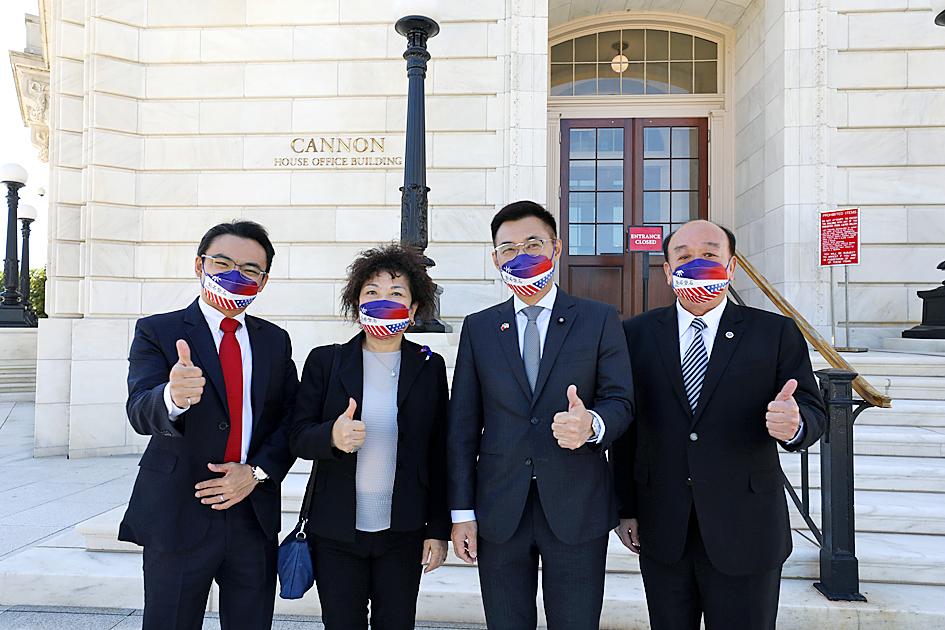A Taiwanese parliamentary delegation on Tuesday began three days of meetings with US officials in the US.
The delegation is led by Chinese Nationalist Party (KMT) Legislator Johnny Chiang (江啟臣), convener of the legislature’s Diplomacy and National Defense Committee. It also includes KMT legislators Wu Sz-huai (吳斯懷), Yeh Yu-lan (葉毓蘭) and Hung Mong-kai (洪孟楷).
They arrived in Washington on Sunday and met with several Taiwanese organizations on Monday.

Photo: CNA
On Tuesday, they met with US Representative Mario Diaz Balart, cochair of the Congressional Taiwan Caucus, and discussed issues pertaining to regional security and negotiations regarding the Taiwan-US Initiative on 21st-century Trade, Chiang said.
The delegation was yesterday to meet with US representatives Chuck Fleischmann and Ben Cline, visit the Washington headquarters of the American Institute in Taiwan, and hold discussions with Taiwan’s diplomatic and military representatives in the US.
In an interview with the Central News Agency, Chiang said the purpose of the visit was to “represent the voice” of the legislature and Taiwanese, including by building support for Taiwan’s participation in international organizations.
The delegation’s meetings would also touch on closely watched issues such as security in the Taiwan Strait and national defense, as well arms sales to Taiwan, he said.
Today, the delegation members are to travel to Phoenix, Arizona, and then Los Angeles, where they are to meet with members of the US Congress in their home districts, said Chiang, who is a former KMT chairman.
During the tenures of Chiang and incumbent KMT Chairman Eric Chu (朱立倫), the party has sought to boost its image as a “pro-US” party. On June 8, it reopened its liaison office in Washington, which had been closed since 2008.

The High Prosecutors’ Office yesterday withdrew an appeal against the acquittal of a former bank manager 22 years after his death, marking Taiwan’s first instance of prosecutors rendering posthumous justice to a wrongfully convicted defendant. Chu Ching-en (諸慶恩) — formerly a manager at the Taipei branch of BNP Paribas — was in 1999 accused by Weng Mao-chung (翁茂鍾), then-president of Chia Her Industrial Co, of forging a request for a fixed deposit of US$10 million by I-Hwa Industrial Co, a subsidiary of Chia Her, which was used as collateral. Chu was ruled not guilty in the first trial, but was found guilty

‘DENIAL DEFENSE’: The US would increase its military presence with uncrewed ships, and submarines, while boosting defense in the Indo-Pacific, a Pete Hegseth memo said The US is reorienting its military strategy to focus primarily on deterring a potential Chinese invasion of Taiwan, a memo signed by US Secretary of Defense Pete Hegseth showed. The memo also called on Taiwan to increase its defense spending. The document, known as the “Interim National Defense Strategic Guidance,” was distributed this month and detailed the national defense plans of US President Donald Trump’s administration, an article in the Washington Post said on Saturday. It outlines how the US can prepare for a potential war with China and defend itself from threats in the “near abroad,” including Greenland and the Panama

DEADLOCK: As the commission is unable to forum a quorum to review license renewal applications, the channel operators are not at fault and can air past their license date The National Communications Commission (NCC) yesterday said that the Public Television Service (PTS) and 36 other television and radio broadcasters could continue airing, despite the commission’s inability to meet a quorum to review their license renewal applications. The licenses of PTS and the other channels are set to expire between this month and June. The National Communications Commission Organization Act (國家通訊傳播委員會組織法) stipulates that the commission must meet the mandated quorum of four to hold a valid meeting. The seven-member commission currently has only three commissioners. “We have informed the channel operators of the progress we have made in reviewing their license renewal applications, and

A wild live dugong was found in Taiwan for the first time in 88 years, after it was accidentally caught by a fisher’s net on Tuesday in Yilan County’s Fenniaolin (粉鳥林). This is the first sighting of the species in Taiwan since 1937, having already been considered “extinct” in the country and considered as “vulnerable” by the International Union for Conservation of Nature. A fisher surnamed Chen (陳) went to Fenniaolin to collect the fish in his netting, but instead caught a 3m long, 500kg dugong. The fisher released the animal back into the wild, not realizing it was an endangered species at